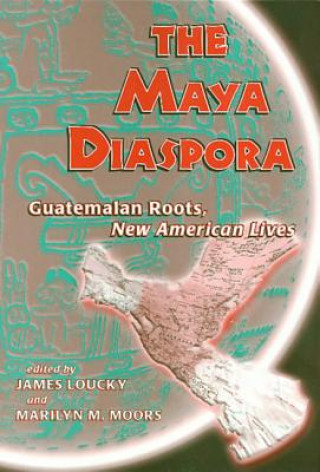
Doručení
Nákupní rádce





Nehodí se? Vůbec nevadí! U nás můžete do 30 dní vrátit
 Dárkový poukaz
V libovolné hodnotě
Dárkový poukaz
V libovolné hodnotě
S dárkovým poukazem nešlápnete vedle. Obdarovaný si za dárkový poukaz může vybrat cokoliv z naší nabídky.
Maya Diaspora
 Angličtina
Angličtina
 94 b
94 b
30 dní na vrácení zboží
Mohlo by vás také zajímat


Maya people have lived for thousands of years in the mountains and forests of what is now Guatemala, but they lost control of their land and became serfs and refugees when the Spanish conquered them in the sixteenth century. Under both the Spanish and the Guatemalan non-Indian elites, they suffered enforced poverty and thereby served as a resident source of cheap labor for non-Maya projects, particularly agricultural production. Following the CIA-induced coup that toppled Guatemala's elected government in 1954, their misery was exacerbated by government accommodation to United States' 'interests', which promoted crops for export and reinforced the need for a source of cheap and passive labor. This widespread poverty was most intense in northwestern Guatemala, where 80 per cent of Maya children were chronically malnourished, and forced a continuing migration to the Pacific coast. The self-help aid that flowed into the area in the 1960s and 1970s raised hopes for justice and equity that were brutally suppressed by Guatemala's military government. This military reprisal led to a massive diaspora of Maya throughout Canada, the United States, Mexico, and Central America. This collection describes that process and the results. The chapters show the dangers and problems of the migratory/refugee process and the range of creative cultural adaptations that the Maya have developed. It provides the first comparative view of the formation and transformation of this new and expanding transnational population, presented from the standpoint of the migrants themselves as well as from a societal and international perspective. Taken together, the chapters furnish unique and ethnographically grounded perspectives on the dynamic implications of uprooting and resettlement, social and psychological adjustment, long-term prospects for continued links to a migration history from Guatemala, and the development of a sense of co-ethnicity with other indigenous people of Maya descent. As the Maya struggle to find their place in a more global society, their stories of quiet courage are representative of many other ethnic groups, migrants, and refugees today. Author note: James Loucky is a Professor teaching anthropology, Latin American studies, and international studies at Western Washington University. Marilyn M. Moors is Professor emerita from Montgomery College, National Coordinator of the Guatemala Scholars Network, and an adjunct professor teaching anthropology and gender at Frostburg State University.
Informace o knize
 Angličtina
Angličtina




 Jak nakupovat
Jak nakupovat

























